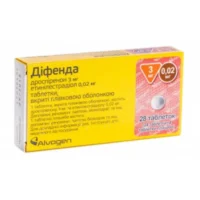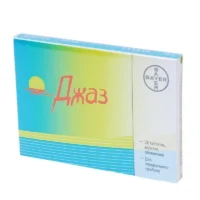Description
Jeanine Coated Tablets №21
Ingredients
Jeanine tablets contain ethinyl estradiol and drospirenone as active ingredients.
Mechanism of Action
Ethinyl estradiol and drospirenone in Jeanine tablets work synergistically to prevent pregnancy by suppressing ovulation and thickening cervical mucus, inhibiting sperm penetration.
Pharmacological Properties
The combination of ethinyl estradiol and drospirenone in Jeanine tablets provides contraceptive effects by modulating hormonal levels to prevent ovulation and altering cervical mucus viscosity.
Indications for Use
Jeanine tablets are indicated for the prevention of pregnancy in women of reproductive age seeking contraception with an oral contraceptive method.
Contraindications
Do not use Jeanine tablets if you have a history of venous thromboembolism, estrogen-sensitive cancers, liver disease, uncontrolled hypertension, or a known hypersensitivity to any components of the tablets.
Side Effects
Common side effects of Jeanine tablets may include nausea, breast tenderness, breakthrough bleeding, headache, and mood changes. Serious but rare side effects can include thromboembolism, liver issues, and cardiovascular events.
Usage Instructions
The recommended dosage is one tablet daily for 21 consecutive days, followed by a 7-day tablet-free interval. Tablets should be taken at the same time each day, with or without food.
Benefits Compared to Analogues
Compared to other combination oral contraceptives, Jeanine tablets offer a similar efficacy in preventing pregnancy but with potentially fewer incidences of adverse effects, making it a favorable choice for many women.
Suitable Patient Groups
Jeanine tablets are suitable for use in women of reproductive age, including adolescents and adults, who desire an effective and convenient contraceptive method.
Storage and Shelf Life
Store Jeanine tablets in a cool, dry place away from direct sunlight. Check the expiration date on the packaging and do not use the tablets if expired.
Packaging Description
Jeanine tablets are typically packaged in blister packs containing 21 tablets, each marked with the day of the week to facilitate correct daily intake.
Clinical Evidence and Proven Effectiveness
Studies have shown that Jeanine tablets are highly effective in preventing pregnancy when taken as directed. The combination of ethinyl estradiol and drospirenone works by inhibiting ovulation and altering the cervical mucus, making it difficult for sperm to reach the egg.
Clinical trials have demonstrated that Jeanine tablets have a similar efficacy profile to other combination oral contraceptives but with potentially fewer side effects, making it a preferred choice for many women.





